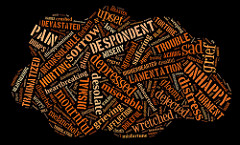Mindfulness is a conscious awareness of doing something, being in the moment with your internal states, including your thoughts, feelings, emotions, bodily sensations, and outer environment. In this post, I wanted to discuss how this technique can be applied to motivate activities that can help improve your confidence.
Mindfulness is ubiquitous in mental health and wellness. Over the past twenty years, I have noticed that this concept recently on the rise is welcoming. Many mind-identified individuals embrace it. But, it can be so much more if we find a creative way to use this principle.
“Mindfulness versus Mindlessness – which would you rather be?”
Mindfulness concerns the mental activity and mental state with thoughtfulness rather than mindlessness. It is an internal and external observation of one’s state without judgment, attention or focus. It is about noticing whatever it is in the moment and letting it go.
 The purpose of mindfulness is to stay neutral to your experiences with the intention of staying with yourself. The idea is to be alert with a focused relaxation. Thoughts and abreactions in the body will arise. You may notice them and observe them without judgement. They will find that they will soon dissipate and disappear.
The purpose of mindfulness is to stay neutral to your experiences with the intention of staying with yourself. The idea is to be alert with a focused relaxation. Thoughts and abreactions in the body will arise. You may notice them and observe them without judgement. They will find that they will soon dissipate and disappear.
Mindfulness helps to improve the processing in the psyche. It helps balance any chemical imbalances in the brain and realign cognitive distortion. It helps bring awareness to thoughts and thinking patterns. It makes conscious your proclivity to analyse, criticise or ruminate in the mind. When you are wide awake to the way you think, and what you tend to think about, you will have the capacity to notice your thinking tendencies, which will, in turn, improve self-awareness and self-consciousness in the realisation. The realisation comes with a sense of achievement and wonders, followed by positive mental and physical feelings.
 In the state of mindfulness, your mental and physical state changes any chemical imbalances in the brain. It makes it rewarding and satisfying. This helps you see your inner resilience and inner strength as you successfully become mindful. You could instantly feel an improvement in your entire being. Eventually, you can feel confident in your achievement of being mindful. Before you know it, you are already motivated to keep practising mindfulness.
In the state of mindfulness, your mental and physical state changes any chemical imbalances in the brain. It makes it rewarding and satisfying. This helps you see your inner resilience and inner strength as you successfully become mindful. You could instantly feel an improvement in your entire being. Eventually, you can feel confident in your achievement of being mindful. Before you know it, you are already motivated to keep practising mindfulness.
Mentally, you will soon notice an improvement in your problem-solving ability and reasoning skills. Improving the mind will help reduce psychic tension, such as anxieties, depression, conflicts and afflictions.
Physically, you will soon notice an improvement in your physiological responses to situations, such as lowering heart rate, lowering blood pressure, and improved sleep. The body will benefit from conditions such as gastrointestinal discomfort, chronic pain, illnesses and dis-ease.
Emotionally, you will soon notice a shift in your feelings and emotions. If you were previously pessimistic, a “glass half empty person”, you might notice that you are becoming optimistic, a “glass half full person” now. You might now recognise how you feel about a distressful situation and find a way to resolve it with ease. As you feel comfortable, you will begin to notice your confidence and esteem rising.
“Mindfulness versus Mindlessness? I know which one I would choose.”
There are many creative ways to incorporate mindfulness into our daily lives. You probably already know how to include mindfulness into your daily ritual. I hope you can feel the difference in this way of being when you make mindfulness a part of your life. And that this positive feeling acts as a motivation for you to keep using the technique. Mindfulness is often used with meditation, relaxation, visualisation, hypnotherapy, and more. However, there are different ways you can apply mindfulness to deepen your self-development.
 Mindful meditation requires you to sit in a meditative lotus posture, preferrable where you can be close to the ground for grounding and support. The combination of mindfulness and meditation is a marriage made in heaven. It is the most effective approach to a mindful state. You might want to explore using mantra words or statements to repeat silently during the meditation.
Mindful meditation requires you to sit in a meditative lotus posture, preferrable where you can be close to the ground for grounding and support. The combination of mindfulness and meditation is a marriage made in heaven. It is the most effective approach to a mindful state. You might want to explore using mantra words or statements to repeat silently during the meditation.
Mantra words or statements for motivation might be; you are a master of your mind and body, you are confident, you can achieve greatness, you can achieve relaxation easily. Perhaps you can think of your own mantra.
Affirmations for motivation in your meditation might include statements such as, I am confident, I am calm, I am relaxed in stressful situations, I am motivated, I am committed to self-care and self-love. Perhaps you can think of more affirmations that suit you better.
Body awareness mindfulness acknowledges the body’s physical state. You might notice the body sensation or discomfort in the meditative state, such as coughing, itching, tingling, and warmth. Whatever the sensation, observe it without judgement or critique. The purpose of this approach is to scan the body so that you can develop an awareness of your body. This is especially effective if you are disidentified or dissociated from the body.
Sensory awareness meditation acknowledges sensations such as tastes, smells, sounds and touches on the skin or body. The purpose of this approach is to observe your senses, including your sixth sense. You can become attuned to your senses through this practice. It helps to develop an awareness of your senses. Everyone has a strong preference for their sensory modality. You might be essentially a visual person. However, to be more self-aware, you need to be aware of all your senses.
 Emotional awareness meditation concerns your feelings emotions. This approach of mindfulness meditation considers being with your feelings and emotions. However, you might already know that it is difficult to practice mindfulness meditation when an emotion grips you. But, this is the best time to use this technique. In a meditative and relaxed state, you can observe your feelings, name them, locate it in the body and bear with them much easier than in the heightened state. In a heightened state, you are reactive to the experience in the situation. In a relaxed state, you are non-reactive but responsive and aware of the emotions. If helpful, you can go into the meditation and recall an event where strong emotions arise. Practice being with your feelings and emotions. Observe them without judging or giving them narratives or meanings. Accepting them as being a part of you and having compassion for the way they had influenced your responses.
Emotional awareness meditation concerns your feelings emotions. This approach of mindfulness meditation considers being with your feelings and emotions. However, you might already know that it is difficult to practice mindfulness meditation when an emotion grips you. But, this is the best time to use this technique. In a meditative and relaxed state, you can observe your feelings, name them, locate it in the body and bear with them much easier than in the heightened state. In a heightened state, you are reactive to the experience in the situation. In a relaxed state, you are non-reactive but responsive and aware of the emotions. If helpful, you can go into the meditation and recall an event where strong emotions arise. Practice being with your feelings and emotions. Observe them without judging or giving them narratives or meanings. Accepting them as being a part of you and having compassion for the way they had influenced your responses.
Behavioural awareness meditation involves being in a meditative state with the intention of observing your behaviour in situations. The aim here is to recognise your behaviours, behave, and react in a situation. You might not like a specific behaviour such as excessive alcohol, drug use, gambling, or eating. This approach works well with unwanted behaviours; such as compulsivity, impulsivity, habitual, addiction, as well as maladaptive or destructive behaviours such as self-harming acts. This mindful technique needs a lot of will or volition. A word of warning, a strong sense of self and ego strength is required to try this method.
Basic mindfulness requires you to sit someplace quiet and be physically still. The purpose of this technique is about being with yourself in your inner world. It is essential to be silent, without external sounds (music, TV, radio etc.). You might not be able to avoid the outside sounds. You might experience abreaction such as a cough, an ache, a cramp and others. Bear with it if you want to experience the positivity of a mindful effect.
Simple mindfulness can be applied to other aspects of your life, such as walking or light exercises like yoga. I use mindfulness regularly for all sorts of reasons. I use mindfulness when I am drawing or painting and running or swimming. I am sure you can also think of your own way to incorporate mindfulness with activities in your life—any activities except driving or anything involving risk to your health and wellness.
To summarise, mindfulness breathing is fantastic for personal development and general wellbeing. It is something that can be done effortlessly. After all, you are breathing right now as you are reading this!
If you are struggling and need support, maybe you will give me a call?


 Mental health concerns the health of our mind, psyche and mental construct. This includes our thoughts, our thinking style and our mental model of the world. The mind never sleeps because it works to ensure that our internal organs are functioning at all times. It operates on a cycle that recurs every twenty-four hours, and it is better known as the
Mental health concerns the health of our mind, psyche and mental construct. This includes our thoughts, our thinking style and our mental model of the world. The mind never sleeps because it works to ensure that our internal organs are functioning at all times. It operates on a cycle that recurs every twenty-four hours, and it is better known as the  You can buy daylight
You can buy daylight  For a healthy body-mind, we need to take care of the physical body as this helps maintain a healthy mind. Eating a regular, colourful and balanced diet is essential for positive physical health.
For a healthy body-mind, we need to take care of the physical body as this helps maintain a healthy mind. Eating a regular, colourful and balanced diet is essential for positive physical health. Naturally, as we take care of our physical body, we also need to consider our Spiritual Self too. Nurturing our spiritual Self include adopting rituals and practices that align with our beliefs, including religious and cultural traditions. Nurturing your soul also include transparency, honesty and being truthful to yourself. This means confessing and admitting your mistakes and take ownership of your responsibilities. Acknowledge your wrongdoings and let go of the false pride. Inevitably, you can find forgiveness for yourself and for others.
Naturally, as we take care of our physical body, we also need to consider our Spiritual Self too. Nurturing our spiritual Self include adopting rituals and practices that align with our beliefs, including religious and cultural traditions. Nurturing your soul also include transparency, honesty and being truthful to yourself. This means confessing and admitting your mistakes and take ownership of your responsibilities. Acknowledge your wrongdoings and let go of the false pride. Inevitably, you can find forgiveness for yourself and for others. Mental health has been a challenge that has recently spiked on the global scale since the pandemic. It has long been a part of Western societies since the birth of psychiatry, and possibly longer than that. Mental disturbances are a challenge that poses psychological and physical discomfort in the individual. Mental disturbances can range from worrying about your loved ones to concern for their safety and welfare. It is any disturbances that are constructed in the mind. The longer we are exposed to these disturbances, the more problem it poses on our mental health. Thus, our mental wellness depends on the way we think and how we construct our inner world.
Mental health has been a challenge that has recently spiked on the global scale since the pandemic. It has long been a part of Western societies since the birth of psychiatry, and possibly longer than that. Mental disturbances are a challenge that poses psychological and physical discomfort in the individual. Mental disturbances can range from worrying about your loved ones to concern for their safety and welfare. It is any disturbances that are constructed in the mind. The longer we are exposed to these disturbances, the more problem it poses on our mental health. Thus, our mental wellness depends on the way we think and how we construct our inner world. Mental health awareness is the ability to develop compassion for ourselves and our mental construct as well as the mental capability of another. It is also about treating ourselves and others the way we would like to be treated. It is about watching our thoughts and thinking well of ourselves and others. Having an awareness of our thought processes give us realisation. In the realisation, we become compassionate with ourselves and how our mind works things out.
Mental health awareness is the ability to develop compassion for ourselves and our mental construct as well as the mental capability of another. It is also about treating ourselves and others the way we would like to be treated. It is about watching our thoughts and thinking well of ourselves and others. Having an awareness of our thought processes give us realisation. In the realisation, we become compassionate with ourselves and how our mind works things out. You are more than your mind. Therefore, you are more than the way you think and what you think. Thinking is just what you happen to do because the brain does not shut up. Thoughts will always intrude on the psyche. But, thought forms, and then they disappear. When you give focus, attention and meaning to the ideas, your thinking and other thought-forms arise to become problematic. It is at this point that having a
You are more than your mind. Therefore, you are more than the way you think and what you think. Thinking is just what you happen to do because the brain does not shut up. Thoughts will always intrude on the psyche. But, thought forms, and then they disappear. When you give focus, attention and meaning to the ideas, your thinking and other thought-forms arise to become problematic. It is at this point that having a